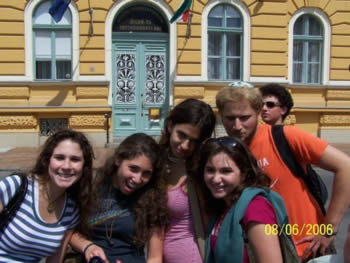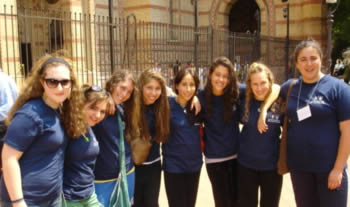Search our Archives:
» Home
» History
» Holidays
» Humor
» Places
» Thought
» Opinion & Society
» Writings
» Customs
» Misc.
|
Exploring Jewish Identities and Heritages
By Rachelle Grossman
This past summer I was part of an inter-denominational group of Jewish teenagers who traveled to Hungary as part of a program called the Szarvas Fellowships. This is a program for exceptional American Jewish teenagers and it has four main goals: to allow teenage Jews to explore our Jewish identities, to deepen our knowledge of our European Jewish heritage, to discover our place in world Jewry, and to promote international Jewish unity by interacting with other Jewish teenagers from all over the world.
For the first weekend, our group toured Budapest and learned about its Jewish history pre and post WWII. We prayed at a Chabad synagogue for Friday night Shabbat services and then at a Neolog synagogue for Saturday morning. Neolog is a term used primarily in Hungary that defines a congregation as observing non-Orthodox Judaism. This term is very general and contains a spectrum of observance from Reform through Conservadox.
For the remaining two weeks of our trip we attend the Ronald S. Lauder Foundation AJJDC International Jewish Summer Camp in Szarvas, Hungary. Known by its staff and campers simply as Camp Szarvas, This camp was started in 1991 to help educate and rebuild the Jewish communities of Eastern Europe following the fall of communism. For two weeks in the summer Jewish kids aged 7-17 from Romania, Poland, Kaliningrad, Russia, Hungary and over 20 other countries come to Szarvas. For many of these campers it is the only time in their entire year where they are Jewish in a Jewish environment.
Since 1999, two delegations of American teenagers come to Camp Szarvas during each summer. The American group consists of a huge range of people. Religiously they are Modern-Orthodox, Conservative, Reform, and Unaffiliated, and they hail from New York to Seattle, Miami to LA…and many places in-between. In addition to doing all of the camp-wide activities, the American group of about 20 explores Jewish identity on personal and communal levels, and confronts central issues of American Jewry such as Egalitarianism, Matrilineal Decent, and Halacha.
Growing up in Spokane, Washington, I have always been very active as a part of a small Jewish minority where I am fairly observant as a Conservative Jew. Because our community is small, Jewish resources are limited. We don’t have a Jewish Day School, the nearest kosher butcher is 275 miles away, and services are held on Shabbat and holidays only. Because of this, I felt very connected to the Jews of Eastern Europe. Many of the friends that I made had similar stories and experiences, yet they lived in Romania or Poland.
In this light I would like to share with you a letter that I wrote to my mother on the flight coming home from Camp Szarvas. In it I shared with her things that frustrated me, surprised me, were foreign to me and yet at the same time familiar. I do hope that you like it.
* * * * *
Dear Mom,
Right now I am on the plane from Hungary to JFK and I thought that I’d write to you and tell you about the highlights of the trip. Firstly, our American group is primarily from Teaneck and NYC. A lot of them are Modern-Orthodox and they don’t have any non-Jewish friends. When I first heard about this, I didn’t understand. No non-Jewish friends? To me, this seemed so weird! But it wasn’t just that. My new friends patiently explained to me that all of their lives they had attended Jewish schools. (Jealousy—If only I could have been so lucky!) They lived in sheltered and religious communities. Not knowing non-Jews was a circumstance, not a choice.
A big part of the American program was sharing our personal Jewish identities. For several meeting sessions throughout camp, each of us in our group took turns discussing what it means to be Jewish and how our lives are influenced by that. During my turn I explained that I find purpose and meaning in Jewish rituals because doing them connects me to all Jews everywhere, which is something quite powerful since there aren’t many Jews walking around downtown Spokane. When we got to talking, the people who lived in secluded groups where it is so easy to be Jewish were actually a little jealous of me. They were jealous that I find such deep importance and meaning in keeping Shabbat and in keeping kosher. They grew up not questioning and not worrying about doing rituals. They never had to consider not going to a school barbeque because the meat wasn’t kosher. They never had to choose between going to a debate tournament on Saturday or going to synagogue. For them, Judaism is a habit. For me, my Jewish identity has grown from adversity, from making a distinction, and from actively choosing to be different.
What separated me from the other Americans, however, connected me to those from Romania, Poland, Hungary and Russia. When I joined USY and I began to meet Jews from all over the country, I was amazed to learn about the places where Jewish resources are abundant. Places with Jewish Community Centers, Hebrew High Schools and kosher Chinese food restaurants, places where men wear kipot while eating hamburgers at kosher diners and places where women can study to become rabbis.

American group outside of the Dohany Synagouge in Budapest
When I think about Szarvas, I recall an interaction I had with a group of girls from Kaliningrad. The Americans and Kaliningradians were mixed into many groups. I was with a few girls from New York and Boston, a Kaliningrad counselor and two Kaliningrad girls who were about 15. We were in these groups to interact and to talk about how we celebrated Shabbat. One of the girls from Kaliningrad asked us how many synagogues there were in New York. We considered it and guessed probably over 100. The girl’s eyes got wide and she started talking to her friend excitedly in Russian. There is only one active synagogue in Kaliningrad.
Throughout the session moments like this happened quite frequently. There was a boy from Romania who was the only Jew in his high school, sometimes he got picked on for being Jewish and his teachers did nothing about it. Some teens from Russia said that they would marry Jewish if they could, but it was extremely difficult to date Jews in their city; because the community is so small, the Jewish boys in their city seemed like brothers.
One story in particular taught me something very important. Sasha was 17 and he was from a city outside of Warsaw, Poland. His city, like so many others, was once a large Jewish center, but after the war was very much destroyed. Now the Jewish community is rebuilding. Sasha told us about living as a teen in Poland, about experiencing anti-Semitism, and about his love of Szarvas. He told us about one of his biggest annoyances: “when Israeli and American Jews come to Poland they always ask ‘why do you stay here? Why do you live here where it is so hard to be Jewish?’” Sasha stressed to us that he stays in Poland because that is where he is needed. He doesn’t want to move to Israel or New York, places where being Jewish is easy, because for him his Jewish identity is defined by the sense of duty to his Jewish community in Poland. “I wish that when people come to see the [concentration] camps that they would also come and see the Jewish culture that is still here in Poland and throughout Europe.” For him, Judaism is so much about life, just as much as it is about remembering the past. He taught me that the places where it is hardest to be Jewish are the places that often need strong, educated Jews the most.

Friends
And the stories continue… there were so many inspiring people with familiar stories! One day I met the Romanian counselor, Anda. I loved talking with her because she, in addition to being very intelligent and kind, really understood me. I couldn’t figure out our connection until one of the last days of camp. I had asked her if she had ever been to America and she told me that a few years ago she realized that she could make her hobby of Jewish teaching a real job, and so she spent two years in New York at the Jewish Theological Seminary. Now she works in Bucharest as an education director. In my Synagogue at home I work very closely with our education director, organizing our intensive B’nai Mitzvah program and teaching Sunday School. I love Jewish Education, and I aspire to go to Jewish Theological Seminary one day. Anda is a huge role model for the girls and women in her community. She’s a huge role model for me. All of this, and she looks no older than 25.
When I think about this trip, I feel like I’ve gotten the complete Jewish experience. I’ve prayed with a mechitza, given a d’var on Shabbat and had debates about egalitarianism. I’ve danced to and sung Jewish songs with people who didn’t know a word of English—yet we understood each other completely. I have made friends from Budapest, Bucharest and Boston. I have looked at myself by looking at others.
Your daughter,
Rachelle
~~~~~~~
from the October 2006 Edition of the Jewish Magazine
|
|
Please let us know if you see something unsavory on the Google Ads and we will have them removed. Email us with the offensive URL (www.something.com)
|
|











